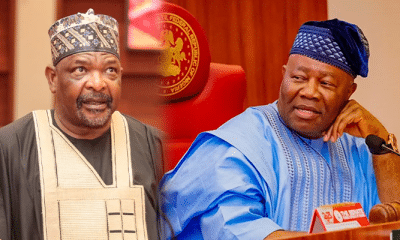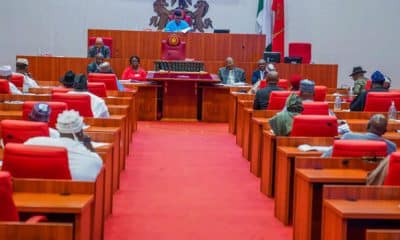Nigeria News
Why We Can’t Disclose Our Findings On Sex Toy Shop Allegation Against Sen. Abbo – Nigerian Senate

Senate Reveals Position On Sex Toy Allegation Against Sen. Abbo
The Nigerian Senate has spoken on why it can’t make public, the details of the findings of its committee set up to investigate the sex toy shop allegations against Senator Elisha Abbo.
The stand of the Senate on the matter was reportedly made public by the Senate spokesperson, Godiya Akwashiki, while speaking with journalists after plenary on Thursday, December 12th.
Naija News recalls the Adamawa lawmaker, Elisha Abbo, was caught on camera assaulting a woman in a sex toy shop in Abuja.
After the video went viral and generated a lot of public backlashes, the Senator had apologized to the lady in the video.
The Police had also swung into action and arraigned the Senator before the Zuba Magistrate’s Court, Abuja.
On its part, the Senate set up an investigative hearing committee to look into the circumstances involving one of its members in the events leading up to the assault on the lady at the sex toy shop.
However, several months after the original incident, the Senate has declared that it may not be able to make the outcome of its investigation into the matter public as the case was already before the court.
“I know vividly when that issue was brought to the plenary under matters of urgent importance, a senator raised an observation saying this issue is in a court of law. It’s not an issue we should disturb ourselves over.
“Please, I want to speak like a lawmaker. Once an issue is in a court of law, there is a limit for us to discuss it in the plenary,” Senator Akwashiki is quoted to have said.
Naija News understands that section 88 of the Nigerian Constitution, empowers the National Assembly to investigate allegations of misconduct against its members.
An investigation by the legislative arm, the section states, could be over the conduct of any “person, authority, or government body that has the duty of executing or administering laws enacted by the National Assembly.”
Although such investigations cannot be aimed to punish, the section states that it shall only be either to “make laws with respect to any matter within its legislative competence and correct any defects in existing laws” or “expose corruption, inefficiency or waste in the execution or administration of laws within its legislative competence.”










